...
{*no-status title-slide} - - - - ## Outline {#the-overview} - Background - Collaboration amongst researchers - What are multiple affiliations - The why and wherefore of multiple affiliations - Research landscape Japan, Germany, UK - Data/Results - Trends in multiple affiliations (WoS) - Survey of authors - Multiple affiliations and research quality - Conclusions ## Background {#the-overview} - Collaboration in science - increase in co-author numbers (Adams et al. 2002; Wuchti et al. 2007) - increased research performance due to collaboration (Katz and Hicks 1997; Wuchty et al. 2007) - reasons: ease of travel/communication; concentration of resources; funders' support (Ding et al. 2010; Freeman et al. 2014) - Multiple affiliations {slide} - attachment to more than one institution (public or private) {slide} - Why and wherefore {slide} - researchers: tap into new networks/ gain additional resources - institutions: assessment / competition (Stephan, 2012 ) - e.g. part-time positions to attract leading foreign scholars (Xin and Normile, 2006; Bhattacharjee, 2011) - institutions/researchers: maintain links ## Background
 Xin and Normile, Science, 313, 22 Sep 2006
Xin and Normile, Science, 313, 22 Sep 2006
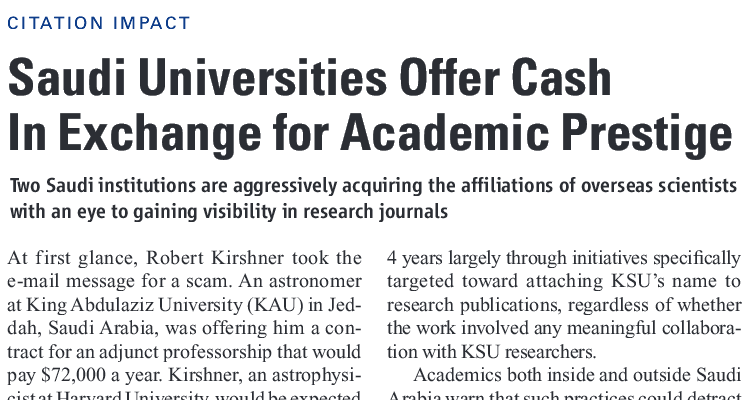 Bhattacharjee, Science, 334, 9 Dec 2011
## Background {#the-quote}
Bhattacharjee, Science, 334, 9 Dec 2011
## Background {#the-quote}
ESF - Science Policy Briefing - 2013: New Concepts of Researcher MobilityCombined, part-time researcher positions will allow mobility and direct knowledge transfer and cooperation and may link institutions, disciplines, countries and sectors (industry/academia/public).
NISTEP - About Pamphlet - 2010 ## Japan - Germany - UK - comparable in terms of academic output (BIS 2013; NISTEP 2014) and in innovative and technological capacity (WEF 2014) - differ in terms of {slide} - governance of academia (e.g. autonomy, staff structures and career trajectories) (Teichler et al. 2013) - importance of the academic research sector compared to business and government research (OECD, 2014) - internationalisation (e.g. higher shares of foreign born staff in the UK) (Franzoni et al. 2012) - in all three changes in {slide} - accountability (assessments, impact considerations) - funding distribution (growing importance of third party funding; performance based distribution of core-funding) - employment (growing number of part-time and fixed-term contracts, more flexible pay schemes) ## Japan - Germany - UKNISTEP endeavors to utilize human resources from foreign countries. As part of these endeavors, NISTEP carries out joint research with foreign researchers, accepts foreign students, and accepts international affiliated fellows.
Article share (world)
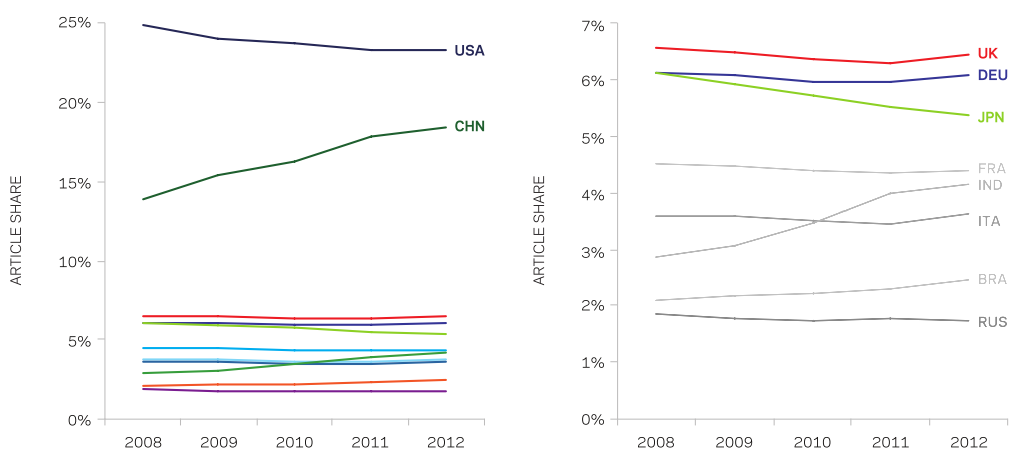 Note: Based on documents listed in Scopus and generated by Elsevier
Note: Based on documents listed in Scopus and generated by ElsevierSource: BIS/13/1297
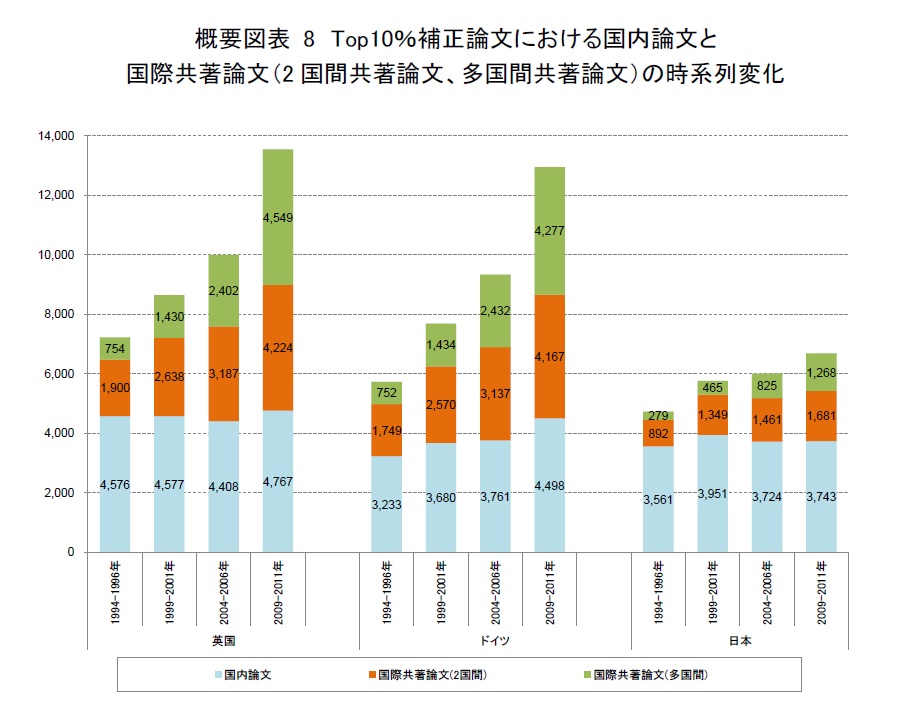 Note: Based on documents listed in Web of Science
Note: Based on documents listed in Web of ScienceSource: 科学技術政策研究所「科学研究のベンチマーキング2012」調査資料ー218 ## Empirical strategy
 ## Data
## Data
 ## Trends in multiple affiliations {image-slide}
-
## Trends in multiple affiliations {image-slide}
- 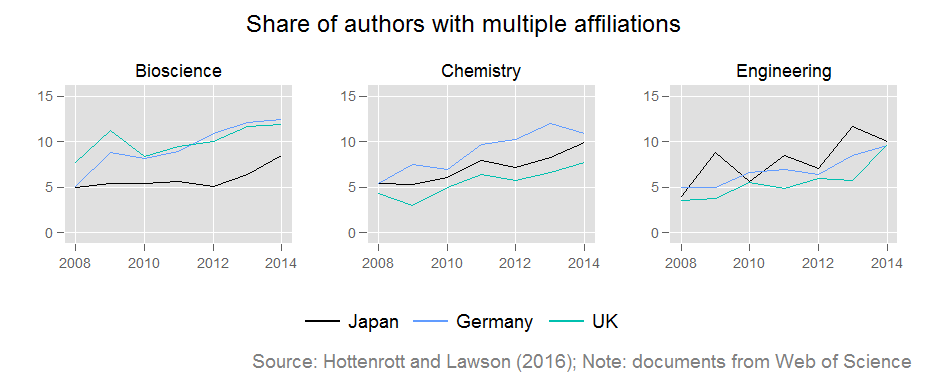 -
-  {slide}
## Statement of affiliations on publications {image-slide}
-
{slide}
## Statement of affiliations on publications {image-slide}
- Share of respondents with multiple affiliations
- @svg: maffil2.svg 800 200
## Institutional incentives {image-slide}
- Naming of affiliations
- @svg: maffil3.svg 700 200
- Incentives to name affiliation
- {slide}
## Type of organisations {image-slide}
- 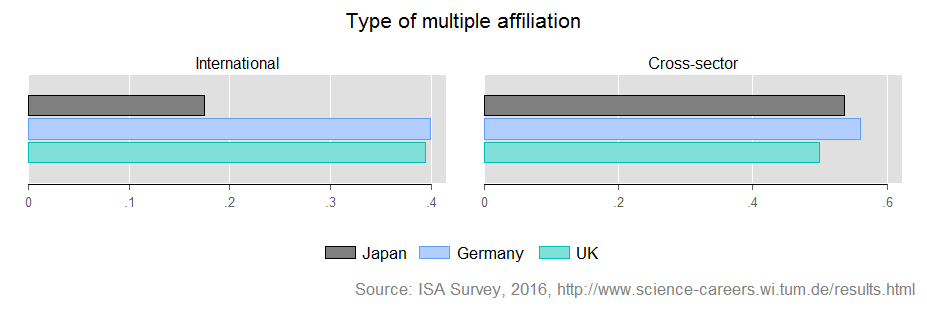 -
- 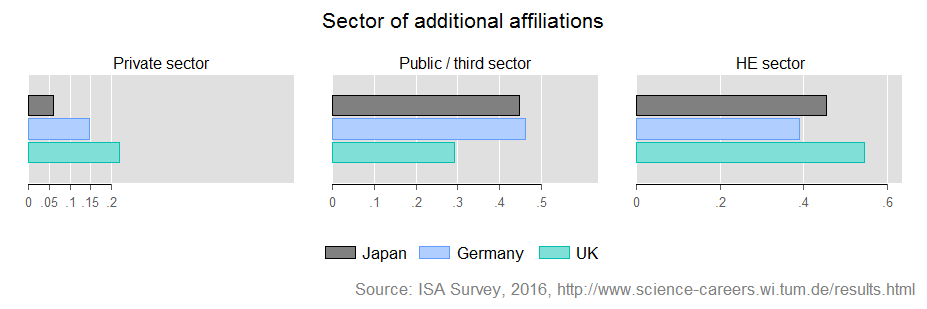 {slide}
## Organisation of multiple affiliations {image-slide}
-
{slide}
## Organisation of multiple affiliations {image-slide}
- Contractual arrangements at main external affiliation
- @svg: maffil4.svg 700 200
Paid contracts by organisation type
Paid contracts by work content
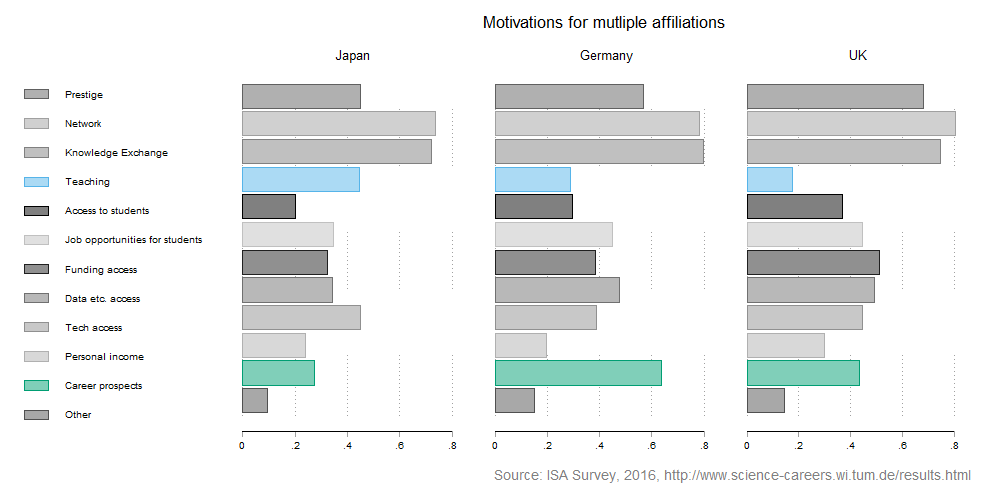 ## Career motivations {image-slide}
## Career motivations {image-slide}
by contract type
by seniority
/ − − automatically replaced by the title